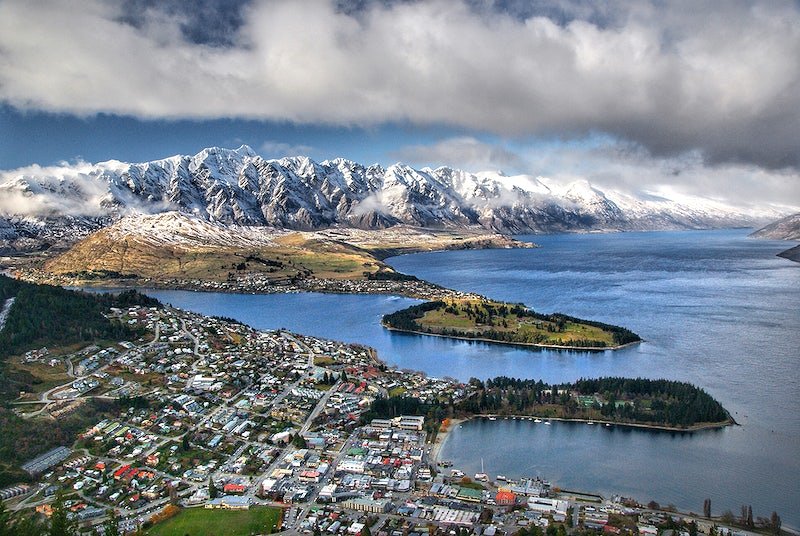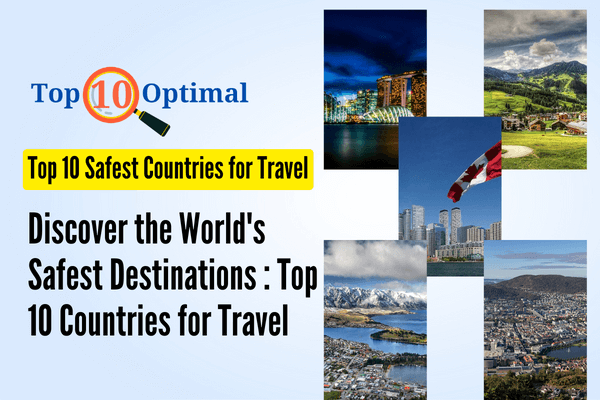Determining the safest countries for travel can be subjective and may depend on various factors, including your personal preferences and the purpose of your trip. However, many organizations and agencies compile safety rankings based on factors such as crime rates, political stability, healthcare quality, and natural disaster preparedness. Keep in mind that the safety situation in any country can change, so it’s essential to stay updated with travel advisories from your government or relevant authorities.
Discover the World’s Safest Destinations : Top 10 Countries for Travel
Iceland
Iceland is often regarded as one of the safest countries for travel. It consistently ranks high in global safety rankings due to its low crime rate, political stability, and well-developed infrastructure. Here are some reasons why Iceland is considered safe for travelers :

Low Crime Rate – Iceland has one of the lowest crime rates in the world, including low rates of violent crime and theft. Violent crime is exceptionally rare, and you can generally feel safe walking around cities and rural areas.
Political Stability – Iceland is known for its stable political environment and low levels of corruption. This contributes to a sense of security for both residents and visitors.
Healthcare Quality – Iceland has a high standard of healthcare, and medical facilities are well-equipped to handle emergencies and routine medical care. Travelers can access quality healthcare services if needed.
Natural Disaster Preparedness – Iceland is prone to natural disasters like volcanic eruptions and earthquakes, but the country is well-prepared to deal with such events. They have a robust monitoring system and emergency response protocols in place.
Small Population – With a relatively small population, Iceland is not crowded, and this can contribute to a feeling of safety. You won’t encounter large crowds in most areas, which can be reassuring for some travelers.
Clean Environment – Iceland is known for its clean and well-maintained environment. This contributes to an overall sense of safety and comfort for travelers.
English Proficiency – Many Icelanders speak English fluently, making it easier for English-speaking tourists to communicate and seek assistance if needed.
While Iceland is generally safe for travelers, it’s essential to exercise common-sense precautions as you would in any destination. This includes safeguarding your belongings, following local laws and regulations, and being aware of your surroundings. Additionally, weather conditions in Iceland can change rapidly, so it’s crucial to be prepared when exploring its beautiful landscapes. Always check weather forecasts and road conditions, especially if you plan to travel outside of urban areas.
New Zealand
New Zealand is often considered one of the safest countries for travel, and it consistently ranks high in global safety rankings. Here are some reasons why New Zealand is regarded as a safe destination for travelers:

Low Crime Rate – New Zealand has a relatively low crime rate, especially when it comes to violent crimes. While petty crimes like theft can occur, they are generally less common compared to many other countries.
Political Stability – New Zealand is known for its stable political environment and a strong rule of law. The country has a well-established democratic system and a reputation for good governance.
Friendly Locals – New Zealanders, known as Kiwis, are known for their friendliness and hospitality towards tourists. You’ll often find locals willing to offer help or advice to travelers.
Beautiful Natural Landscapes – New Zealand’s stunning landscapes, from snow-capped mountains to pristine beaches, provide travelers with opportunities for safe outdoor adventures like hiking, camping, and water sports.
Quality Healthcare – New Zealand has a high standard of healthcare, and medical facilities are well-equipped. Travelers can access quality medical services if needed.
English Language – English is the primary language spoken in New Zealand, making it easier for English-speaking tourists to communicate and seek assistance if necessary.
Strong Tourism Infrastructure – New Zealand has a well-developed tourism infrastructure, including well-marked roads, information centers, and a range of accommodation options. This makes it easy for travelers to navigate and plan their trips.
Limited Infectious Diseases – New Zealand has had relatively low rates of infectious diseases, making it a safe destination in terms of health concerns.
Safe Transportation – New Zealand’s transportation system is known for its safety, whether you’re traveling by car, bus, or domestic flights.
Strict Biosecurity Measures – New Zealand takes its biosecurity seriously to protect its unique ecosystems. This can contribute to a sense of safety as it reduces the risk of encountering harmful pests or diseases.
While New Zealand is generally safe for travelers, it’s essential to exercise common-sense precautions, such as safeguarding your belongings, following local laws, and being aware of your surroundings. New Zealand is also known for its changeable weather conditions, so be prepared for sudden weather changes, especially if you plan to engage in outdoor activities. Always stay updated on local advisories and safety guidelines, and respect the natural environment and local customs while visiting.
Switzerland
Switzerland is often considered one of the safest countries for travel. It consistently ranks high in global safety rankings due to various factors. Here are some reasons why Switzerland is regarded as a safe destination for travelers:

Low Crime Rate – Switzerland has a very low crime rate, particularly when it comes to violent crimes. The country is known for its safety, and tourists generally feel secure while visiting.
Political Stability – Switzerland is known for its long-standing political stability and neutrality in international conflicts. Its stable political environment contributes to a sense of security for both residents and visitors.
Efficient Public Services – Switzerland has efficient public services, including well-organized transportation systems, healthcare facilities, and law enforcement agencies.
Cleanliness and Orderliness – Switzerland is famous for its cleanliness and orderliness. Its cities and towns are well-maintained and have clean streets, which adds to the overall sense of safety.
High-Quality Healthcare – Switzerland has a high standard of healthcare, and medical facilities are well-equipped to handle emergencies and routine medical care.
Strong Rule of Law – Switzerland has a strong rule of law and a reputation for upholding the rights and safety of its residents and visitors.
Scenic Landscapes – Switzerland’s beautiful landscapes, including the Swiss Alps and pristine lakes, offer travelers opportunities for safe outdoor activities such as hiking, skiing, and mountaineering.
Multilingual Population – Switzerland has four official languages—German, French, Italian, and Romansh. English is also widely spoken, making communication easy for tourists.
Safe Transportation – Switzerland’s transportation network, including its trains, trams, and buses, is known for its safety and efficiency.
Low Risk of Natural Disasters – Switzerland has a relatively low risk of natural disasters such as earthquakes, hurricanes, or tsunamis, which contributes to a sense of safety.
While Switzerland is generally safe for travelers, it’s essential to exercise common-sense precautions, such as safeguarding your belongings and following local laws and regulations. Be prepared for varying weather conditions, especially in the mountainous regions, and ensure you have proper travel insurance to cover any unforeseen events. Additionally, always stay updated on local advisories and safety guidelines, and respect local customs and regulations while visiting.
Singapore
Singapore is often regarded as one of the safest countries for travel, consistently ranking high in global safety rankings. This island city-state is known for its strict laws and efficient governance, contributing to a high level of safety for both residents and tourists. Here are some reasons why Singapore is considered a safe destination for travelers:

Low Crime Rate – Singapore has an exceptionally low crime rate, particularly when it comes to violent crimes. Crimes like theft and burglary are relatively rare, making it a safe place to walk around even at night.
Strict Laws and Enforcement – Singapore is known for its strict laws and regulations, which are enforced rigorously. This includes rules related to public cleanliness, traffic laws, and drug-related offenses.
Efficient Law Enforcement – Singapore’s law enforcement agencies are highly efficient and responsive, ensuring a quick response to emergencies and maintaining public safety.
Political Stability – Singapore has a stable political environment, and it is known for its strong rule of law and good governance.
Clean and Well-Maintained Environment – Singapore is famous for its cleanliness and well-maintained urban infrastructure, which adds to the overall sense of safety.
High-Quality Healthcare – Singapore has world-class healthcare facilities, making it a safe destination in terms of healthcare services.
Multilingual Population – English is one of the official languages in Singapore, and it is widely spoken, making it easy for English-speaking tourists to communicate and seek assistance.
Safe Transportation – Singapore’s public transportation system, including buses and trains, is known for its safety and efficiency.
Low Risk of Natural Disasters – Singapore has a relatively low risk of natural disasters such as earthquakes, hurricanes, or tsunamis, contributing to a sense of safety.
Strict Biosecurity Measures – Singapore has stringent biosecurity measures in place to prevent the introduction of harmful pests and diseases, ensuring the safety of its ecosystems.
While Singapore is generally safe for travelers, it’s important to be aware of and respect the country’s strict laws and regulations. Common-sense precautions, such as safeguarding your belongings and following local rules, are essential. Additionally, always stay updated on local advisories and safety guidelines, and be mindful of cultural sensitivities and customs while visiting. Singapore is known for its diverse culture, so it’s a good idea to learn about local customs and traditions to ensure a respectful and enjoyable visit.
Norway
Norway is often considered one of the safest countries for travel, and it consistently ranks high in global safety rankings. Here are some reasons why Norway is regarded as a safe destination for travelers:

Low Crime Rate – Norway has a very low crime rate, particularly when it comes to violent crimes. The country is known for its safety, and tourists generally feel secure while visiting.
Political Stability – Norway is known for its political stability and strong democratic institutions, contributing to a sense of security for both residents and visitors.
Efficient Public Services – Norway offers efficient public services, including well-organized transportation systems, healthcare facilities, and law enforcement agencies.
Clean and Well-Maintained Environment – Norway is famous for its pristine and well-preserved natural landscapes as well as clean and well-maintained cities and towns.
High-Quality Healthcare – Norway provides a high standard of healthcare, with modern medical facilities that can handle emergencies and routine medical care.
Strong Rule of Law – Norway has a strong rule of law and is known for upholding the rights and safety of its residents and tourists.
Beautiful Natural Landscapes – Norway’s breathtaking natural landscapes, including fjords, mountains, and Northern Lights, offer safe opportunities for outdoor activities such as hiking, skiing, and sightseeing.
English Proficiency – Many Norwegians speak English fluently, making communication easy for English-speaking tourists.
Safe Transportation – Norway’s transportation network, including trains, buses, and ferries, is known for its safety and efficiency.
Low Risk of Natural Disasters – Norway has a relatively low risk of natural disasters such as earthquakes, hurricanes, or tsunamis, which contributes to a sense of safety.
While Norway is generally safe for travelers, it’s essential to exercise common-sense precautions, such as safeguarding your belongings and following local laws and regulations. Be prepared for varying weather conditions, especially in the northern regions, and ensure you have proper travel insurance to cover any unforeseen events. Additionally, always stay updated on local advisories and safety guidelines, and respect local customs and regulations while visiting. Norway is known for its unique culture and traditions, so learning about them can enhance your travel experience and ensure a respectful visit.
Denmark
Denmark is often considered one of the safest countries for travel, and it consistently ranks high in global safety rankings. Here are some reasons why Denmark is regarded as a safe destination for travelers:

Low Crime Rate – Denmark has a very low crime rate, particularly when it comes to violent crimes. The country is known for its safety, and tourists generally feel secure while visiting.
Political Stability – Denmark is known for its political stability and strong democratic institutions, contributing to a sense of security for both residents and visitors.
Efficient Public Services – Denmark offers efficient public services, including well-organized transportation systems, healthcare facilities, and law enforcement agencies.
Clean and Well-Maintained Environment – Denmark is famous for its clean and well-maintained cities and towns, which adds to the overall sense of safety.
High-Quality Healthcare – Denmark provides a high standard of healthcare, with modern medical facilities that can handle emergencies and routine medical care.
Strong Rule of Law – Denmark has a strong rule of law and is known for upholding the rights and safety of its residents and tourists.
Friendly Locals – Danes are known for their friendliness and hospitality towards tourists, which can enhance the sense of safety for travelers.
Safe Transportation – Denmark’s transportation network, including trains, buses, and bicycles, is known for its safety and efficiency.
Low Risk of Natural Disasters – Denmark has a relatively low risk of natural disasters such as earthquakes, hurricanes, or tsunamis, which contributes to a sense of safety.
English Proficiency – Many Danes speak English fluently, making communication easy for English-speaking tourists.
While Denmark is generally safe for travelers, it’s essential to exercise common-sense precautions, such as safeguarding your belongings and following local laws and regulations. Be aware of potential scams or petty theft in crowded tourist areas, but such incidents are relatively rare. Additionally, always stay updated on local advisories and safety guidelines, and respect local customs and regulations while visiting. Denmark has a rich cultural heritage, so learning about local customs and traditions can enhance your travel experience and ensure a respectful visit.
Finland
Finland is often considered one of the safest countries for travel, and it consistently ranks high in global safety rankings. Here are some reasons why Finland is regarded as a safe destination for travelers:

Low Crime Rate – Finland has a very low crime rate, particularly when it comes to violent crimes. The country is known for its safety, and tourists generally feel secure while visiting.
Political Stability – Finland is known for its political stability and strong democratic institutions, contributing to a sense of security for both residents and visitors.
Efficient Public Services – Finland offers efficient public services, including well-organized transportation systems, healthcare facilities, and law enforcement agencies.
Clean and Well-Maintained Environment – Finland is famous for its clean and well-maintained cities and towns, as well as its pristine natural landscapes.
High-Quality Healthcare – Finland provides a high standard of healthcare, with modern medical facilities that can handle emergencies and routine medical care.
Strong Rule of Law – Finland has a strong rule of law and is known for upholding the rights and safety of its residents and tourists.
Beautiful Natural Landscapes – Finland’s stunning natural landscapes, including forests, lakes, and the Northern Lights, offer safe opportunities for outdoor activities such as hiking, skiing, and wildlife watching.
English Proficiency – Many Finns speak English fluently, making communication easy for English-speaking tourists.
Safe Transportation – Finland’s transportation network, including trains, buses, and ferries, is known for its safety and efficiency.
Low Risk of Natural Disasters – Finland has a relatively low risk of natural disasters such as earthquakes, hurricanes, or tsunamis, which contributes to a sense of safety.
While Finland is generally safe for travelers, it’s essential to exercise common-sense precautions, such as safeguarding your belongings and following local laws and regulations. Be prepared for varying weather conditions, especially in the winter, and ensure you have proper travel insurance to cover any unforeseen events. Additionally, always stay updated on local advisories and safety guidelines, and respect local customs and regulations while visiting. Finland has a unique cultural heritage, so learning about local customs and traditions can enhance your travel experience and ensure a respectful visit.
Austria
Austria is often considered one of the safest countries for travel, and it consistently ranks high in global safety rankings. Here are some reasons why Austria is regarded as a safe destination for travelers:

Low Crime Rate – Austria has a relatively low crime rate, particularly when it comes to violent crimes. The country is known for its safety, and tourists generally feel secure while visiting.
Political Stability – Austria is known for its political stability and strong democratic institutions, contributing to a sense of security for both residents and visitors.
Efficient Public Services – Austria offers efficient public services, including well-organized transportation systems, healthcare facilities, and law enforcement agencies.
Clean and Well-Maintained Environment – Austria is famous for its clean and well-maintained cities, towns, and scenic landscapes.
High-Quality Healthcare – Austria provides a high standard of healthcare, with modern medical facilities that can handle emergencies and routine medical care.
Strong Rule of Law – Austria has a strong rule of law and is known for upholding the rights and safety of its residents and tourists.
Beautiful Natural Landscapes – Austria’s stunning natural landscapes, including the Alps, lakes, and historic towns, offer safe opportunities for outdoor activities such as hiking, skiing, and cultural exploration.
Safe Transportation – Austria’s transportation network, including trains, trams, and buses, is known for its safety and efficiency.
Low Risk of Natural Disasters – Austria has a relatively low risk of natural disasters such as earthquakes, hurricanes, or tsunamis, which contributes to a sense of safety.
Multilingual Population – While the official language of Austria is German, many Austrians speak English, and you’ll find it relatively easy to communicate with locals.
While Austria is generally safe for travelers, it’s essential to exercise common-sense precautions, such as safeguarding your belongings and following local laws and regulations. Be prepared for varying weather conditions, especially in the mountainous regions, and ensure you have proper travel insurance to cover any unforeseen events. Additionally, always stay updated on local advisories and safety guidelines, and respect local customs and regulations while visiting. Austria has a rich cultural heritage, so learning about local customs and traditions can enhance your travel experience and ensure a respectful visit.
Canada
Canada is often considered one of the safest countries for travel, and it consistently ranks high in global safety rankings. Here are some reasons why Canada is regarded as a safe destination for travelers:

Low Crime Rate – Canada has a relatively low crime rate, especially when it comes to violent crimes. The country is known for its safety, and tourists generally feel secure while visiting.
Political Stability – Canada is known for its political stability, strong democratic institutions, and rule of law, contributing to a sense of security for both residents and visitors.
Efficient Public Services – Canada offers efficient public services, including well-organized transportation systems, healthcare facilities, and law enforcement agencies.
Clean and Well-Maintained Environment – Canada is famous for its clean and well-maintained cities, towns, and natural landscapes.
High-Quality Healthcare – Canada provides a high standard of healthcare, with modern medical facilities that can handle emergencies and routine medical care.
Strong Rule of Law – Canada has a strong rule of law and is known for upholding the rights and safety of its residents and tourists.
Beautiful Natural Landscapes – Canada’s stunning natural landscapes, including national parks, forests, and lakes, offer safe opportunities for outdoor activities such as hiking, camping, and wildlife watching.
Multicultural Population – Canada is known for its multiculturalism, and it is a welcoming and diverse country. Visitors from various backgrounds often feel comfortable and respected.
Safe Transportation – Canada’s transportation network, including planes, trains, buses, and roadways, is known for its safety and efficiency.
Low Risk of Natural Disasters – While Canada is not entirely free from natural disasters, it has a relatively low risk compared to some other countries. It is less prone to earthquakes, hurricanes, and tsunamis.
While Canada is generally safe for travelers, it’s essential to exercise common-sense precautions, such as safeguarding your belongings and following local laws and regulations. Be prepared for varying weather conditions, especially in the northern and mountainous regions, and ensure you have proper travel insurance to cover any unforeseen events. Additionally, always stay updated on local advisories and safety guidelines, and respect local customs and regulations while visiting. Canada’s rich cultural diversity and indigenous heritage make it a unique destination, so learning about local customs and traditions can enhance your travel experience and ensure a respectful visit.
Japan
Japan is often considered one of the safest countries for travel, and it consistently ranks high in global safety rankings. Here are some reasons why Japan is regarded as a safe destination for travelers:

Low Crime Rate – Japan has an exceptionally low crime rate, particularly when it comes to violent crimes. Crimes like theft and burglary are relatively rare, making it one of the safest countries in the world for tourists.
Political Stability – Japan is known for its political stability, efficient government, and strong rule of law, which contribute to a sense of security for both residents and visitors.
Efficient Public Services – Japan offers efficient public services, including well-organized transportation systems, healthcare facilities, and law enforcement agencies.
Clean and Well-Maintained Environment – Japan is famous for its cleanliness and well-maintained cities and towns, as well as its beautiful natural landscapes.
High-Quality Healthcare – Japan provides a high standard of healthcare, with modern medical facilities that can handle emergencies and routine medical care.
Strong Rule of Law – Japan has a strong legal system and is known for upholding the rights and safety of its residents and tourists.
Safe Transportation – Japan’s transportation network, including trains, buses, and subways, is known for its safety, punctuality, and efficiency.
Low Risk of Natural Disasters (excluding earthquakes) – While Japan is prone to earthquakes, the country is well-prepared for seismic activity, and it has a relatively low risk of other natural disasters such as hurricanes, tsunamis, or volcanic eruptions.
Respectful Culture – Japanese society places a high value on respect and politeness. Travelers often find the local culture to be welcoming and respectful.
Multilingual Services – In major tourist areas, you can find information and services available in English and other languages, making it easier for non-Japanese speakers to navigate and communicate.
While Japan is generally safe for travelers, it’s essential to exercise common-sense precautions, such as safeguarding your belongings and following local laws and customs. Be aware of local etiquette and cultural practices, as they can differ from Western norms. Additionally, always stay updated on local advisories and safety guidelines, and be prepared for any potential natural disasters, especially earthquakes, which can occur in Japan. Overall, Japan’s unique culture, history, and landscapes make it a fascinating and safe destination for travelers.

